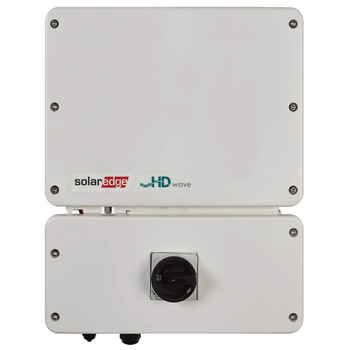Hybrid Inverters
Hybrid inverters are used in systems that have both renewable energy sources and a backup power source, such as a battery bank or a diesel generator. These inverters can manage the flow of power between the renewable energy sources, the backup power source, and the utility grid.
-

Fronius
$2,999.99With the Fronius GEN24 Plus, you can choose between the PV Point and an essential backup option which provides backup power up to the output power of the inverter as long as enough PV production or battery supply power is available. Two backup power...$2,999.99 -

Fronius
$2,472.99With the Fronius GEN24 Plus, you can choose between the PV Point and an essential backup option which provides backup power up to the output power of the inverter as long as enough PV production or battery supply power is available. Two backup power...$2,472.99 -

Fronius
$2,256.99With the Fronius GEN24 Plus, you can choose between the PV Point and an essential backup option which provides backup power up to the output power of the inverter as long as enough PV production or battery supply power is available. Two backup power...$2,256.99 -

Fronius
$1,838.99With the Fronius GEN24 Plus, you can choose between the PV Point and an essential backup option which provides backup power up to the output power of the inverter as long as enough PV production or battery supply power is available. Two backup power...$1,838.99 -

Fronius
$3,827.99With the Fronius GEN24 Plus, you can choose between the PV Point and an essential backup option which provides backup power up to the output power of the inverter as long as enough PV production or battery supply power is available. Two backup power...$3,827.99 -
SolarEdge
$2,199.00Single Phase Home Hub inverter, 3.8kW on-grid, 11.4kW off-grid w/ PCS certified revenue Grade metering and Consumption Monitoring, w/ Cellular Modem and plan Domestic Content Inverter - Must be paired with SE-U650-1GM4MRMU SolarEdge Power Optimizers...$2,199.00 -
SolarEdge
$3,399.00Single Phase Home Hub inverter, 10kW on-grid, 11.4kW off-grid w/ PCS certified revenue Grade metering and Consumption Monitoring, w/ Cellular Modem and plan Domestic Content Inverter - Must be paired with SE-U650-1GM4MRMU SolarEdge Power Optimizers...$3,399.00 -
SolarEdge
$3,499.00Single Phase Home Hub inverter, 11.4kW on-grid, 11.4kW off-grid w/ PCS certified revenue Grade metering and Consumption Monitoring, w/ Cellular Modem and plan Domestic Content Inverter - Must be paired with SE-U650-1GM4MRMU SolarEdge Power Optimizers...$3,499.00 -

SolarEdge
$3,799.00Single Phase Home Hub, 11.4kW on-grid, 11.4kW Stand-alone, w/ RGM and Consumption Monitoring, 5 yr cellular plan. Features: The ultimate home energy manager in charge of PV production, battery storage, backupoperation during a power outage*, EV...$3,799.00 -

SolarEdge
$2,799.00Single Phase Home Hub, 7.6kW on-grid, 11.4kW Stand-alone, w/ RGM and Consumption Monitoring, 5 yr cellular plan. Features: The ultimate home energy manager in charge of PV production, battery storage, backupoperation during a...$2,799.00 -

Fronius
$1,440.99The Fronius GEN24 serves as the core of your PV system, offering the flexibility to use your self-produced solar energy even during power outages. This European string inverter stands out with its cutting-edge technology and smart solutions, saving...$1,440.99 -

Fronius
$1,845.40The Fronius GEN24 serves as the core of your PV system, offering the flexibility to use your self-produced solar energy even during power outages. This European string inverter stands out with its cutting-edge technology and smart solutions, saving...$1,845.40
Frequently Asked Questions About Hybrid Inverters
A: A hybrid inverter is a type of inverter that can function in both grid-tied and off-grid mode. It is designed to convert DC power from solar panels or batteries into AC power for use in homes or businesses.
A: In grid-tied mode, a hybrid inverter feeds excess power generated by solar panels back into the grid, while in off-grid mode, it uses power stored in batteries to supply electricity. When there is insufficient solar energy or battery power, the inverter can automatically switch to grid power to ensure a continuous supply of electricity.
A: A hybrid inverter offers the flexibility to use solar energy and battery storage to reduce reliance on grid power. This can result in lower energy bills and increased energy independence. It also provides backup power during power outages.
A: When choosing a hybrid inverter, consider the inverter's capacity, input voltage range, efficiency, and battery compatibility. It is also important to ensure that the inverter is compatible with the solar panels and other components of the system.
A: A traditional inverter is designed to convert DC power from solar panels into AC power for use in homes or businesses, but it cannot operate in off-grid mode or provide backup power during power outages. A hybrid inverter can operate in both grid-tied and off-grid mode and provide backup power during power outages.
A: A hybrid inverter can be used in most locations, but it is important to consider factors such as climate, temperature, and humidity when choosing an inverter. In some cases, additional equipment or modifications may be necessary to ensure proper operation.
A: The cost of a hybrid inverter depends on its capacity, features, and manufacturer. Generally, hybrid inverters are more expensive than traditional inverters due to their additional functionality.
A: While a homeowner with some electrical and technical expertise can install a hybrid inverter, it is recommended to have it installed by a professional to ensure proper installation and operation.



